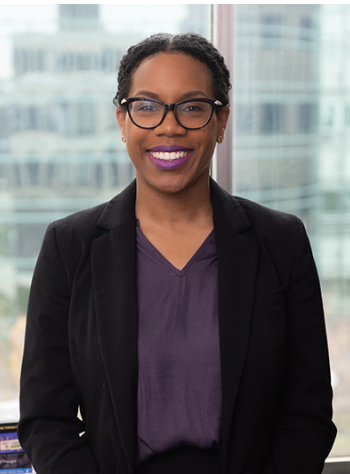New assistant professor to research black girls' over-representation among youth disciplined in Detroit schools

As a young woman, Erica Edwards was inspired by a quote: "Be the kind of woman a girl like you needed." As an assistant professor of educational leadership and policy studies in the Wayne State University College of Education, Edwards strives to be that woman in her teaching, research and service.
Edwards grew up in Detroit and attended school in Ann Arbor. After earning a bachelor's in history from Spelman College and a master of science in education from the University of Pennsylvania, she taught social studies to middle school students in Philadelphia but quickly became disillusioned. "I felt like schools were not healthy places, and I didn't want to be part of a system that I saw as broken," she said.
The experience awakened her passion for social justice and built her consciousness around what disparity looks like and how it happens. Edwards accepted a position as director of afterschool programs for Sasha Bruce Youthwork, a Washington, DC-based nonprofit supporting runaway, homeless, abused and neglected youth. Edwards advocated for the educational needs of youth coming out of juvenile detention. The work opened her eyes to the opposition young people - particularly young women of color - face in the educational system.
"I became passionate about vulnerable African American girls because I saw just how many were really struggling - and not just in terms of getting through school," she said. "Some needed help with the basics-housing, food, and clothing."
She also learned about policy barriers and formerly incarcerated youth have to overcome to be successful.
"Schools didn't want to enroll kids because they had a juvenile background," Edwards said. "Records would get lost, and people wouldn't return phone calls. We couldn't figure out what grade they were supposed to be in, and when we did, we would find that they were over-age for their grade level. There were so many barriers to their success that were far beyond simply having the motivation to go."
As a result, Edwards and a friend developed a youth-led organizing program for Sasha Bruce Youthwork. Its goal was to help young people understand the socio-historical factors behind their realities and empower them to change their circumstances through political participation.
"It was wonderful. I came to see education as a communal endeavor that is infused with joy and love when we take it out of a teacher-centered approach and make it a student-centered experience," she said. "I went back to graduate school because I thought it would be great if we could develop school communities where students were empowered leaders and where their voices were central to how things are done. My goal is to continue that work in a more formal way through partnerships with school systems."
Her doctoral studies at Georgia State focused on black girlhood in urban public schools, with emphasis on the experiences of girls who experience chronic school conflict. Edwards said she is equally concerned with all vulnerable youth populations, but chose to focus on black girls because society tends to pay more attention to risks black boys face. Educational research is only beginning to probe how those same grave disproportionalities exist among black girls, said Edwards.
"My dissertation looked at school re-entry experiences of African American girls who were on probation. It was a direct outgrowth of the organizing work I did in DC," said Edwards. "I learned that it is not easy to navigate schools when you have been stigmatized as a so-called trouble-maker. I'm eager to use my findings to help schools think through how they can support vulnerable black girls and, by extension, all youth with feeling safe and supported at school."
Edwards viewed coming to Wayne State as an opportunity to return to her roots; her mother attended classes and worked here, and all her aunts are alumnae.
"When I got the opportunity to interview, I said, 'If I get an offer, I am coming,'" she said. "It is a great honor to use my education to give back to the city, especially as it moves in a new direction. I want to make sure that people who we sometimes overlook get to be part of what is happening here."
Most importantly, she wanted to be part of a team whose mission is to have a positive impact on education in Detroit.
"All the faculty in this program are specifically focused on bringing educational equity and opportunity to the city of Detroit," she said. "The most exciting thing is that students can actually get involved and see what research for community change actually looks like. I was excited because I knew I would be part of a team that isn't just talking about it; they are being about it."
by Tracy A. Walker